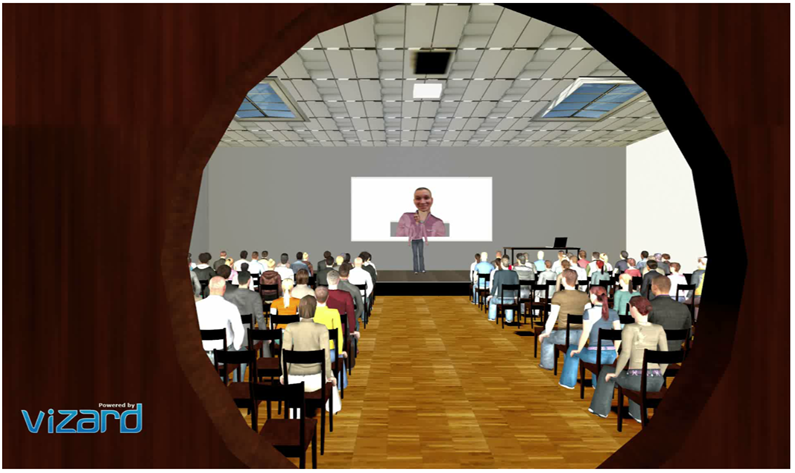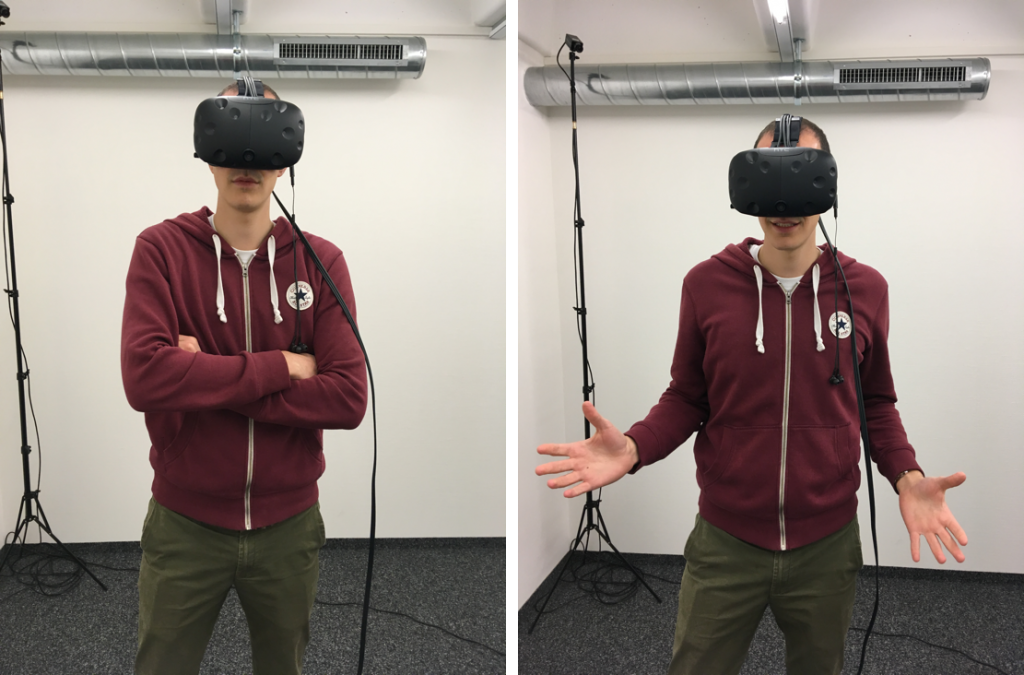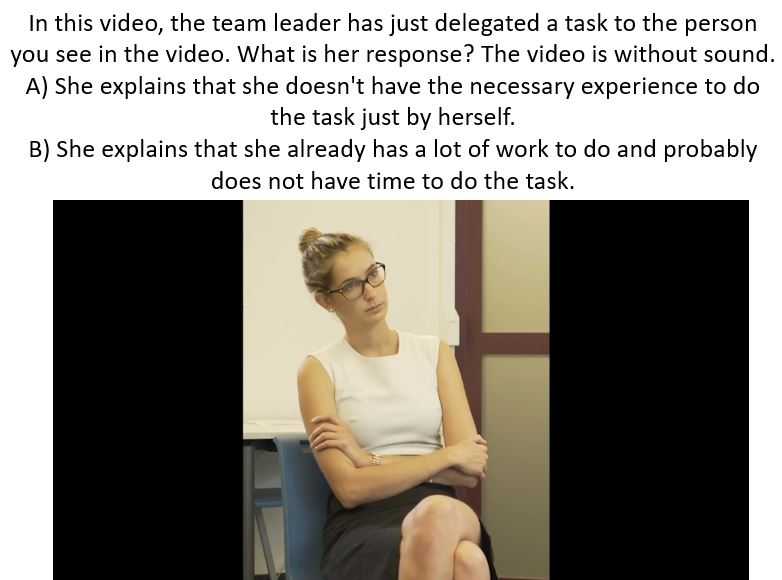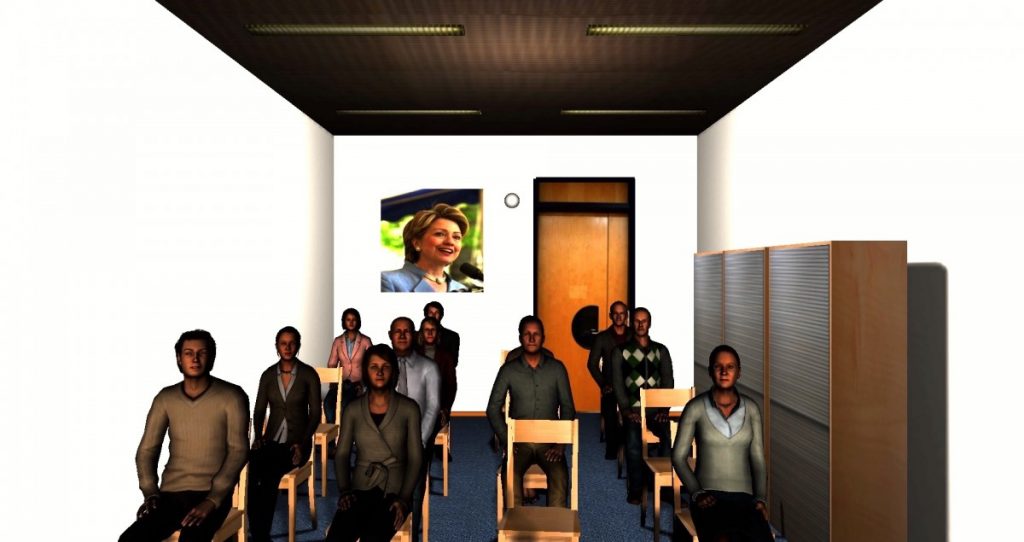Learning from the self

When learning interpersonal skills, we copy role models and the more similar the role models are to ourselves, the more efficient the skill acquisition is. We test whether when taking ourselves as role model for behavior that we do not yet master, we learn better than when we use a role model that is not ourselves. We use different technologies to create role models that look like us, doppelganger (virtual humans that look like us – based on photographs of our face – but behave independently of us and that we can meet in immersive virtual reality) or pose transfer (a deep learning technique that can transpose body movements of a role model to a video of us).
Researchers currently involved : Dr. Laetitia Renier, Dr. Emmanuelle Kleinlogel, Prof. Dr, Schmid Mast
EPFL, Laboratory of Behavioral Genetics: Prof. Dr. Carmen Sandi, Dr. Joao Rodrigues, Marion Cuddy
IIIT Bangalore, Multimodal Perception Lab: Prof. Dr. Dinesh Babu Jayagopi, Kumar Shubham
Current funding: SNF Sinergia Project: Go Where No-One Has Gone: Virtual Reality for Interpersonal Skills Training,https://p3.snf.ch/Project-183564
Behavioral adaptability

Our research shows that for a social interaction to be successful there is not a “one size fits all” interpersonal style a person has to apply. Rather, a person’s interaction style should be flexible and tailored toward the social interaction partner. Behavioral adaptability is the extent to which an individual changes his or her interpersonal interaction style as a function of what the social interaction partner wants or needs. We investigate how behavioral adaptability pays off for doctors when interacting with different patients and for leaders when interacting with different collaborators.
Researchers currently involved : Phebe Driebergen, Dr. Valérie Carrard, Dr. Tristan Palese, Prof. Dr, Schmid Mast
CHUV: Prof. Dr. Alexandre Berney
Current funding: Marianne Schmid Mast is PI in the SNF Project: Behavioral Adaptability, https://p3.snf.ch/Project-184858
Current funding: Marianne Schmid Mast is project partner in the SNF Project: Longitudinal study of medical students’ interpersonal competence and mental health: the ETMED-L study, https://p3.snf.ch/Project-197442
Storytelling in digital interviews

When asked behavioral interview questions about a specific skill, job applicants’ answers follow a storyline. We investigate whether answering an interview question concerning a specific skill (e.g., leadership) is related to showing this particular skill in a real social interaction. We use ASR (automatic speech recognition) and NLP (natural language processing) measure automatically the extent to which applicants use storytelling and whether it reflects mastery of the said specific skill.
Researchers currently involved : Dr. Laetitia Renier, Prof. Dr, Schmid Mast
University of Neuchâtel: Prof. Dr. Adrian Bangerter, Elisabeth Germanier
IDIAP, Martigny: Dr. Phil Garner, Youssef Janjar
Current funding: Marianne Schmid Mast is Co-PI in the SNF Project: Storytelling and first impressions in face-to-face and algorithm-powered digital interviews, https://p3.snf.ch/Project-197479
Women and entrepreneurship

Women entrepreneurs raise smaller amounts of venture capital funding than men, even in the case of having applications of similar quality or presenting similar business ideas. We investigate how the implementation of verbal and nonverbal charisma (a distinct type of verbal and nonverbal behavior) influences the likelihood of funding success for women entrepreneurs through experiments using virtual humans, textual data, and field study analysis. The goal of this research is to see whether the effectiveness of verbal and nonverbal charisma differs for women and men entrepreneurs, as well as developing effective tactics that women entrepreneurs can use to increase the likelihood of their funding success.
Researchers currently involved: Anely Bekbergenova, Prof. Dr, Schmid Mast, Prof. Dr. John Antonakis, Prof. Dr. Franciska Krings
Stereotypes or actual differences in behavior?

There are differences in how women and men perform when self-promoting, that is women underperform when self-promoting. What we do not know is whether this difference in performance is due to women’s actions, or because of listeners’ reactions. We thus investigate this question by using an experimental paradigm where we manipulate gender in virtual reality and use an incentivized investment task. We aim to disentangle the expresser from the perceiver effect on self-promotional speeches and help maximize equal opportunities for women to become leaders.
Researchers currently involved: Matthieu Jost, Prof. Dr, Schmid Mast
ESCP Business School: Prof. Dr. Gwendolin Sajons
Current funding: Marianne Schmid Mast and Gwendolin Sajons obtained a grant from the Diligentia Stiftung
Human reactions to technology

Job interview trainings done on digital platforms, algorithms who make mistakes… The brave new world confronts us humans with new technologies and we investigate how we react to those technologies. We study whether job applicants present themselves differently when they are interviewed face-to-face or via a digital platform. We also study whether humans react differently toward algorithms and humans making the exact same mistakes. Future research will focus on investigating whether charismatic communication about algorithms and artificial intelligence in the workplace mitigates aversion toward erring algorithm and promotes trust in algorithms. Studying human reactions to technology is crucial to understand human-machine interaction, particularly in a society where the prevalence of technology in private and professional life is growing fast.
Researchers currently involved: Prof. Dr, Schmid Mast, Dr. Emmanuelle Kleinlogel, Dr. Laetitia Renier, Anely Bekbergenova, Anaïs Butera
IIIT Bangalore, Multimodal Perception Lab: Prof. Dr. Dinesh Babu Jayagopi, Kumar Shubham
Nonverbal behavior
We study nonverbal behavior in social interactions and particularly in job interviews. Our lab has a longstanding experience in nonverbal behavior coding and in automatically extracting nonverbal behavior from videotaped social interactions via social sensing. We are also studying the effectiveness of different types of nonverbal behavior in the entrepreneurial setting.
Researchers currently involved : Prof. Dr, Schmid Mast, Dr. Laetitia Renier, Anely Bekbergenova
Northeastern University: Prof. Dr. Judith Hall
Layola Marymount University: Prof. Dr. Nora Murphy IDIAP, Martigny: Prof. Dr. Daniel Gatica-Perez
Effects of social power

The power literature shows that obtaining social power affects behavior, thinking, and perception. We question whether power per se explains many of the documented effects in the literature and suggest that the way power is understood or operationalized might drive many of the effects. We showed, for instance, that power was not related to risk-taking when power was primed as actual power and not just as a power mindset and when risk-taking was measured in a consequential way and not as a self-report.
Researchers currently involved : Dr. Mahshid Khademi, Prof. Dr. Christian Zehnder, Prof. Dr, Schmid Mast
ETHZ: Prof. Dr. Petra Schmid
Northeastern University: Prof. Dr. Judith Hall
Power and interpersonal behavior
How does the fact of obtaining power affect how a person behaves interpersonally? We show that feeling powerful can empower a person when presenting him- or herself in front of an evaluation panel; he or she feels less stressed and fidgets less and thus conveys a better impression. Also, feeling empowered by a role model helps women when faced with a leadership task to perform better. We investigate also how the way power is understood affects ethical interpersonal interaction behavior.
Researchers currently involved : Phebe Driebergen, Prof. Dr, Schmid Mast
Queens University, Ireland: Prof. Dr. Ioana Latu
First impressions and interpersonal accuracy

We readily form first impressions about our social interaction partners. Although they can be biased by stereotypes and thus be wrong, oftentimes these first impressions and judgements are accurate. We show that people in general are able to accurately tell who is the boss in a social gathering and that recruiters are able to accurately judge the personality profile of job applicants simply based on short (2 min) video clips. We developed an interpersonal accuracy test for the workplace, the WIPS.
Researchers currently involved : Dr. Nele Dael, Prof. Dr, Schmid Mast
Northeastern University: Prof. Dr. Judith Hall
Physician-patient interaction
The way physicians interact with their patients affects not only how satisfied patients are with the consultation, it also affects their health. We show how gender of the physician and physician interaction style including nonverbal behavior affect consultation outcomes. We also test how different types of communication training for medical students affect their communication skills.
Researchers currently involved : Dr. Valérie Carrard, Prof. Dr, Schmid Mast
CHUV: Prof. Dr. Alexandre Berney
Responsible interpersonal behavior

Not only are we affected by stereotypes that bias how we interact with others, we are also affected by opportunities to either look out for ourselves or to do the right thing and act responsibly and ethically. We investigate conditions under which employees resist unethical requests from their supervisors and traders make responsible investment decisions.
Researchers currently involved : Dr. Emmanuelle Kleinlogel, Prof. Dr, Schmid Mast
University of St.Gallen: Prof. Dr. Karl Frauendorfer, Prof. Dr. Robert Gutsche

